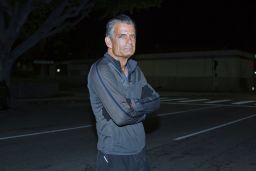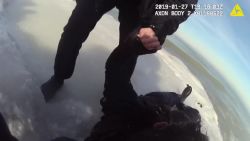Editor’s Note: Know someone who inspires you? Click here to nominate them as a CNN Hero.
He is a 62-year-old superior court judge. They are former addicts and felons. Some of them have completed prison sentences; others have lived under bridges.
All of them, however, are part of one team: the Skid Row Running Club in Los Angeles.
Twice a week, before the sun comes up, Judge Craig Mitchell runs the mile from his office at the county courthouse to The Midnight Mission, a social services organization centered in Downtown’s Skid Row – the notorious area where the city’s largest homeless population resides.

“It’s not an overstatement to say that on any given morning I personally look at hundreds of people within eight blocks. On either side of every sidewalk there are people in tents,” Mitchell said. “It’s a dangerous place. I’ve been physically assaulted on Skid Row. People approach me asking if I want to buy drugs.”
At the mission, he meets a group of 30 to 40 people, and together they run through East L.A.
The group includes runners from all walks of life and all levels of athleticism. Some members are homeless or in recovery, and others are lawyers, social workers, students or off-duty LAPD officers.
Mitchell developed the program in 2012 after a man he’d once sentenced to prison returned to thank him.
“He was paroled to The Midnight Mission and decided to come back and say, ‘Thank you, Judge Mitchell, for treating me like a human being.’ The president of the mission at the time asked me if there was something that I could do to contribute to the mission’s program, and I thought of starting a running club. That was the inception,” Mitchell said.
Between 300 and 500 people have since run with the group, now an official nonprofit. Every year, Mitchell takes his most dedicated Skid Row runners on a free trip to participate in an international marathon.
“I come back to the courthouse after any run and check off who was there. And so, I know exactly who has been faithful to the running program and who just comes periodically,” he said.
In recent years, Mitchell and club members have participated in marathons in Ghana, Rome, Vietnam and Jerusalem.
Mitchell says he’s seen participants turn their lives around, attending college, securing full-time employment and maintaining sobriety.
“Running is a mechanism for the participants to build relationships,” he said. “You can be a horrible runner and benefit the same as our fast runners, because at the end of the day you’re going to be surrounded by people who really care about you and want to spend time with you. Everybody is welcome. We affirm. We listen. We support.”
CNN’s Allie Torgan spoke with Mitchell about his work. Below is an edited version of their conversation.
CNN: Did you ever imagine taking on this role?
Judge Craig Mitchell: When I went down to The Midnight Mission that one afternoon with the parolee, I had absolutely no idea that my life would play out this way. I was just a volunteer coming to The Midnight Mission. I didn’t know what I was doing. I don’t think The Midnight Mission really knew what direction this would take. I crossed over the line from simply being his sentencing judge to being someone who’s trying to guide him into a decision-making process that might break the cycle.
I really understood that if I could run with people who are trying to rebuild their lives, deal with addiction issues, deal with homelessness, that would facilitate some very meaningful conversations and build relationships between myself and the people I was running with. One of our runners said, “Judge, your life has taken this direction because almost on a lark one day, you decided to say ‘yes’ to this person.”
This “yes” has turned into one of the defining aspects of my life. When those things happen, and you don’t plan it, it’s nothing short of glorious. I couldn’t be happier.
CNN: How did you change your own running schedule to make it work?
Mitchell: Interestingly enough, my free time was in the afternoon after court. But I learned very quickly that for a lot of the people who are in recovery at the mission, that is when they attend their A.A. (Alcoholics Anonymous) meetings. So, I was never going to get anybody out there on the pavement if I ran in the afternoon.
So, the suggestion by the runners were, “Let’s try it in the mornings. Show up at 5:30, we’re available. Nobody is asking us to go to any meetings at 5:30.” So, I did. And we run now three days a week. We do our long runs largely in Pasadena on the weekends. I find the runners really enjoy getting out of Skid Row, being able to sit down in the park after a long run and share a meal together.
CNN: How has your professional path helped prepare you for this role?
Mitchell: I was a high school teacher for 17 years. I buried a fair number of my students who were the victims of gang violence. So, I saw the real toll that criminal conduct, gang activity, took on people that I really cared about.
I went to law school at night, and my commitment to practice in the criminal law area was largely driven by my experience teaching in the inner-city of Los Angeles. And so, it was a natural draw to me to work as a prosecutor, to try and hold the people who were inflicting that type of pain and loss within our community to answer for it.
I ended up putting my papers in to be a judge because I saw judges in the best of circumstances could make a tremendous difference. But I would not trade the 17 years I spent teaching high school for anything. It certainly made me a better prosecutor and has made me a far better judge.
Want to get involved? Check out the Skid Row Running Club website and see how to help.
To donate to Skid Row Running Club via CrowdRise, click here.






















